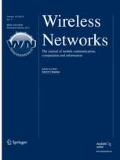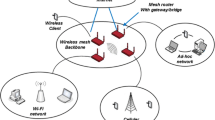Abstract
Wireless Mesh Networks (WMN) is a key backhaul technology used in 802.11 networks to provide ubiquitous coverage to isolated areas that require high-speed connectivity. The multi-radio feature of WMN has enabled the mesh routers to derive the full benefits of multiple channels for providing parallel transmissions in a single collision domain. However, co-channel interfering links badly affect the channel capacity and force the mesh routers to switch the radio interface to other less interfering channel. In dynamic channel assignment, if the channel switches occur frequently, the traffic disruptions lead to excessive packet delays and drops. These problems are mostly observed in specific dense areas, where traffic saturation occurs. The existing schemes lack in properly identifying the bandwidth starved links. Therefore, the focus of this paper is to enhance the throughput and minimize the packet drops by critically identifying the bottleneck links and prioritize them for better channel assignments. The proposed metric exploits the statistical inference on dropped packets to determine the effect of interference on the achievable capacity of the links. The traffic load and the effective capacity are collectively used to identify the saturated links. The proposed metric has been evaluated through extensive simulations. The results demonstrate the validation of proposed metric with a considerable increase in performance.







Similar content being viewed by others
References
Gmez, D., Rodrguez, E., Aguero, R., Monoz, L. (2014). Reliable communications over wireless mesh networks with inter and intra-flow network coding. In Proceedings of the 2014 Workshop on ns-3, ACM: Atlanta, Georgia, USA, pp. 1–8.
Avallone, S., Stasi, G., & Kassler, A. (2013). A traffic-aware channel and rate reassignment algorithm for wireless mesh networks. Mobile Computing, IEEE Transactions on, 12(7), 1335–1348.
Skalli, H., Ghosh, S., Das, S. K., Lenzini, L., & Conti, M. (2007). Channel assignment strategies for multiradio wireless mesh networks: Issues and solutions. Communications Magazine, IEEE, 45(11), 86–95.
Sarasvathi, V., & Iyengar, N. C. S. N. (2012). Centralized rank based channel assignment for multi -radio multi-channel wireless mesh networks. Procedia Technology, 4, 182–186.
Ahmad, N. (2011). Enhanced topology control interference aware channel assignment algorithm. Ottawa: Carleton University.
Doraghinejad, M., Pour, H. N., & Mahani, A. (2014). Channel assignment in multi-radio wireless mesh networks using an improved gravitational search algorithm. Journal of Network and Computer Applications, 38, 163–171.
Kumar, N., Chilamkurti, N., & Lee, J. H. (2013). UBMR-CA: Utility-based multicast routing and channel assignment with varying traffic demands in multi-radio multi-channel wireless mesh networks. Mathematical and Computer Modelling, 57(11–12), 2750–2763.
Lin, J. W., & Lin, S. M. (2014). A weight-aware channel assignment algorithm for mobile multicast in wireless mesh networks. Journal of Systems and Software, 94, 98–107.
Riggio, R., Rasheed, T., Testi, S., Granelli, F., & Chlamtac, I. (2011). Interference and traffic aware channel assignment in WiFi-based wireless mesh networks. Ad Hoc Networks, 9(5), 864–875.
Haoudar, N. E., Maach, A. (2012). In Routing metric for Wireless Mesh Networks, innovative computing technology (INTECH), 2012 second international conference on, 18–20 Sept. 2012, pp. 57–62.
Silva, A. P., Burleigh, S., Hirata, C. M., & Obraczka, K. (2015). A survey on congestion control for delay and disruption tolerant networks. Ad Hoc Networks, 25(Part B(0)), 480–494.
Yu, B., & Xu, C. (2013). Efficient QoS scheme in network congestion. In W. Du (Ed.), Informatics and management science VI (Vol. 209, pp. 111–119). London: Springer.
Joseph, V., & Veciana, G. D. (2011). Stochastic networks with multipath flow control: Impact of resource pools on flow-level performance and network congestion. ACM SIGMETRICS Performance Evaluation Review, 39(1), 61–72.
Juraschek, F. S. (2014). Distributed channel assignment for interference-aware wireless mesh networks. Mathematisch-Naturwissenschaftliche Fakultät II.
Kolar, V. (2007). Routing and traffic-engineering in multi-hop wireless networks an optimization based approach 91.
Gopalakrishna, A., Ha, D. B. (2013). In Capacity analysis of cognitive radio relay networks with interference power constraints in fading channels. Computing, Management and Telecommunications (ComManTel), 2013 International Conference on, 21–24 Jan 2013, pp. 111–116.
Siris, V. A., & Delakis, M. (2011). Interference-aware channel assignment in a metropolitan multi-radio wireless mesh network with directional antennas. Computer Communications, 34(12), 1518–1528.
Ding, Y., & Xiao, L. (2011). Channel allocation in multi-channel wireless mesh networks. Computer Communications, 34(7), 803–815.
Valarmathi, K., Malmurugan, N. (2010) Joint design of congestion control routing with distributed multi channel assignment in wireless mesh networks. arXiv preprint arXiv:1004.1774.
Torshizi, S. D. S., Kwong, K. H., Chieng, D., Ng, S. C., Hashim, F. (2013). In elastic fair rate allocation scheme for multi-radio wireless mesh networks, personal indoor and mobile radio communications (PIMRC), 2013 IEEE 24th International Symposium on, 8–11 Sept 2013, pp. 2695–2700.
Rosen, R. (2014). Internet control message protocol (ICMP). In Linux Kernel networking (pp. 37–61), Apress.
Shi, W., Li, Y., Wang, J., Shang, S. (2014). Routing metric for wireless mesh networks using partially overlapped channels.
Li, Q., Gao, W., Zhu, S., & Cao, G. (2012). A routing protocol for socially selfish delay tolerant networks. Ad Hoc Networks, 10(8), 1619–1632.
Xiaoshuang, X., Tao, J., Yan, H., Hongjuan, L., Xiuzhen, C. (2013). In Channel quality prediction based on Bayesian inference in cognitive radio networks, INFOCOM, 2013 Proceedings IEEE, 14–19 April 2013, pp. 1465–1473.
Jaoua, N., Duflos, E., Vanheeghe, P., Clavier, L., Septier, F. (2011). In Impulsive interference mitigation in ad hoc networks based on alpha-stable modeling and particle filtering. Acoustics, speech and signal processing (ICASSP), 2011 IEEE international conference on, 22–27 May 2011, pp. 3548–3551.
Bolstad, W. M. (2013). Introduction to Bayesian statistics. London: Wiley.
Ayach, O. E., Peters, S. W., & Heath, R. W. (2013). The practical challenges of interference alignment. Wireless Communications, IEEE, 20(1), 35–42.
Liu, J., & Chung, S. H. (2013). An efficient load balancing scheme for multi-gateways in wireless mesh networks. Journal of information processing systems, 9(3), 365–378.
Shah, I. A., Jan, S., Khan, I., Mehmood, M. A., & Shah, M. A. (2014). Qos based joint channel assignment and routing in wireless mesh networks. World Applied Sciences Journal, 31(10), 1809–1827.
Yong, D., Pongaliur, K., & Li, X. (2013). Channel allocation and routing in hybrid multichannel multiradio wireless mesh networks. Mobile Computing, IEEE Transactions on, 12(2), 206–218.
Wang, J., Shi, W., Cui, K., Jin, F., & Li, Y. (2015). Partially overlapped channel assignment for multi-channel multi-radio wireless mesh networks. Journal of Wireless Communications Network, 1, 1–12.
Al Islam, A. A. B. M., Islam, M. J., Nurain, N., & Raghunathan, V. (2016). Channel assignment techniques for multi-radio wireless mesh networks: A survey. IEEE Communications Surveys and Tutorials, 18(2), 988–1017.
MalekpourShahraki, M., Barghi, H., Azhari, S. V., & Asaiyan, S. (2016). Distributed and energy efficient scheduling for IEEE802.11 s wireless EDCA networks. Wireless Personal Communications, 90(1), 301–332.
Acknowledgement
This research is supported by the Ministry of Higher Education Malaysia (MOHE) in collaboration with the Research Management Center (RMC) at the Universiti Teknologi Malaysia (UTM) under Vot Number Q.J130000.2528.06H00.
Author information
Authors and Affiliations
Corresponding author
Rights and permissions
About this article
Cite this article
Iqbal, S., Abdullah, A.H., Ahsan, F. et al. Critical link identification and prioritization using Bayesian theorem for dynamic channel assignment in wireless mesh networks. Wireless Netw 24, 2685–2697 (2018). https://doi.org/10.1007/s11276-017-1471-8
Published:
Issue Date:
DOI: https://doi.org/10.1007/s11276-017-1471-8




